That's the reason why Phuket's beaches form items one, two and three of Phuketwan's PHUKET 10/10 campaign. Our intention is to list 10 key points that must be fixed to ensure Phuket's future.
Prime Minister Yingluck Shinawatra and her government have the power to gift Phuket some cash for infrastructure when Cabinet meets on March 19-20 on Phuket.
But reforms are required that go beyond cash handouts. While Phuket can certainly use some long-overdue special projects, what's even more important is to reverse the damage being done to Phuket's most valuable tourist attractions - the beaches.
AFTER the 2004 tsunami, Phuket had the chance to start over. The island's beaches had all been washed clean. The opportunity was there. But the once-in-a-lifetime moment passed, and before long, the clutter and the chaos returned. Seven years on, and commercialisation is now on the verge of ruining some Phuket beaches. Unless the process is reversed soon, the chaos and the clutter is likely to destroy them all. Kata, Karon, Kata Noi, Laem Sing, Surin, Nai Yang and Nai Harn were once high on any list of Asia's best beaches, with Patong and Kamala a little bit further back and Bang Tao, Nai Thon and Mai Khao perfect on the right kind of day. Not any more. There isn't much time left.
PERHAPS the worst sign of Phuket's coastal deterioration is the way in which pollution is allowed to happen. If German television camera crews can find bad water at Phuket's beaches, you can bet that do-nothing local authorities know it's there, too. The day will come when tourists start to fall sick because of the poor water quality at Phuket beaches. That will be the beginning of the end for Phuket tourism.
THE NUMBER of jet-skis continues to increase on Phuket's beaches. There's now hardly a stretch of sand on the island where jet-skis cannot be found. Insurance schemes have failed to halt the scamming in the past. Insurance is certain to fail again. Of all the private commercial operations on Phuket's public beaches, the jet-skis and the continuing scams remain the biggest black mark.
INSTEAD of being the responsibility of look-the-other-way local authorites - they continue to show a lack of concern for preservation and protection - it's time for all of Phuket's beaches to be placed under one authority. That authority can then impose consistent standards and control the level of commercial activity on all the beaches. If the profits from controlled, selective commercial activities were devoted to protecting and improving the beaches, then Phuket's once-golden sands would stand of chance of being returned to their former glory. If the numbers of visitors to Phuket's beaches continue to grow, there will be no room for swimmers and jet-skis. Phuket must either do away with jet-skis entirely, as Krabi and Phang Nga have already managed to do, or push them offshore to operate more safely from pontoons. Heed the example of Boracay, now Asia's top beach. A radical problem needs a radical solution: we'd recommend empowering the Royal Thai Navy, which already has a role protecting Thailand's coast, with enforcing the rules as set out by the new Phuket Beach Authority.
Three down, seven to go. Look for more in the PHUKET 10/10 series this coming week.

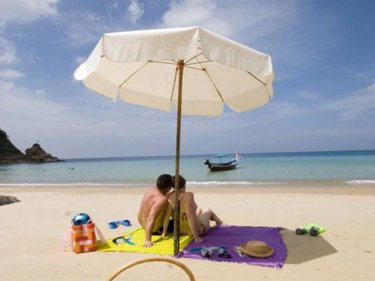

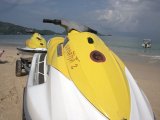

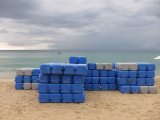
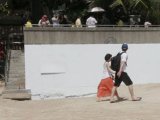




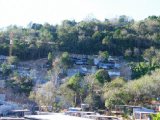





Good read this article, pretty well thought out and presented for the readers here. I like the idea of having the protection of beaches the responsibility of "one authority", but that alone won't solve all of the problems, one of which is listed in the article.
A designated authority should certainly be able to control and/or regulate jet-ski scams and over-commercialisation of the beach fronts. But controlling pollution of the sea is a whole different ball game. It is the one very disturbing and potentially game-ending problem mentioned here as the "black water" situation.
Environmental standards would first need to be set. That, I would assume, would require laws to be enacted to set those standards in place, and laws made to force compliance of those standards. Possibly a main water treatment plant (or several?) would need to be built on the island. Constant testing and monitoring of the waters and pollution control systems would need to take place. The plants themselves, additions and/or changes to associated infrastructure, and the oversight, staffing, and implementation of these controls would be very expensive.
Sounds like a perfect start to a "who's expected to pay for all this stuff?" argument!
Additionally, this would require cooperation from many different 'agencies' beyond that of a central authority. Each town/community and industry (tourism included) on the island would need to be on board to see that the standards are set in place, and then enforced. Which would make it much more difficult, and as mentioned expensive, than merely having 'one authority' to oversee the beaches. The more agencies that get involved, the more it invites a lack of control over the end result. (Too many cooks... and all that.)
I'm not by any means an authority on pollution and pollution controls, but just thinking off the top of my head here. It's not an impossible task, but judging by how problems usually get solved (or not) here, it would indeed be a daunting task for Phuket. And at the very least would take many years to set in place.
Posted by Relox on March 11, 2012 21:25